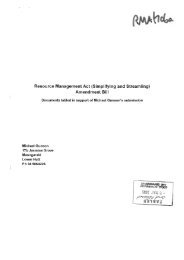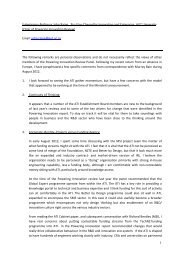(TAKUTAI MOANA) BILL E kau I te wai e, e kau I te wa
(TAKUTAI MOANA) BILL E kau I te wai e, e kau I te wa
(TAKUTAI MOANA) BILL E kau I te wai e, e kau I te wa
Create successful ePaper yourself
Turn your PDF publications into a flip-book with our unique Google optimized e-Paper software.
Detailed TRW Comments on the Marine and Coastal Area (Takutai<br />
Moana) Bill.<br />
3.1 Discriminatory Form of Title<br />
3.1. The new form of customary title proposed by the Bill fails to recognise<br />
and provide for the mana and authority that our hapū and iwi have<br />
exercised in relation to our takutai Moana from time immemorial, and<br />
that <strong>wa</strong>s pro<strong>te</strong>c<strong>te</strong>d by Te Tiriti o Waitangi.<br />
3.2 The Waitangi Tribunal has repor<strong>te</strong>d that the harbour and its foreshores<br />
were and remain crucial aspects of Tauranga Moana iwi and hapū<br />
economic, cultural and spiritual well-being and identity. Tauranga Moana<br />
<strong>wa</strong>s and is, clearly and indisputably, a taonga of all of the hapū of<br />
Tauranga Moana, including Ngā hapū o Ngāti Ranginui. The Tribunal<br />
went further to find that in usurping ownership over Tauranga Moana the<br />
Crown commit<strong>te</strong>d a number of Treaty breaches. 4<br />
TRW submits that this<br />
usurpation is continued by the Marine and Coastal Area (Takutai Moana)<br />
Bill.<br />
3.3 The Bill constructs a space <strong>te</strong>rmed the common marine and coastal area<br />
of which no one is capable of owning (clause 11). The Bill then specifically<br />
excludes freehold title loca<strong>te</strong>d within the foreshore and seabed from<br />
forming part of that common marine and coastal area (clause 7). The Bill<br />
therefore retains privilege to an exclusive group of existing priva<strong>te</strong><br />
owners that have freehold in their land contiguous to the foreshore and<br />
seabed and crea<strong>te</strong>s a new form of title for iwi and hapū that is specifically<br />
defined as being less than freehold title (clause 63). The Bill is selective<br />
about what parts of the foreshore are seabed are available under the<br />
new customary marine title and then heavily limits the rights available to<br />
hapū and iwi in clause 64. This new form of title is therefore a<br />
discriminatory form of title that disadvantages TRW in that it is a<br />
subordina<strong>te</strong> title predica<strong>te</strong>d on a notion of essentially subordina<strong>te</strong> Māori<br />
rights. TRW therefore urges the select commit<strong>te</strong>e to rectify this aspect of<br />
the Bill.<br />
4 Page 608.<br />
8






![Full evidence text [PDF 8908k] - New Zealand Parliament](https://img.yumpu.com/14025494/1/184x260/full-evidence-text-pdf-8908k-new-zealand-parliament.jpg?quality=85)
![−3 JUN 2009 IRELEASED] - New Zealand Parliament](https://img.yumpu.com/12829724/1/185x260/3-jun-2009-ireleased-new-zealand-parliament.jpg?quality=85)
![Full paper text [PDF 3515k] - New Zealand Parliament](https://img.yumpu.com/11267192/1/184x260/full-paper-text-pdf-3515k-new-zealand-parliament.jpg?quality=85)


![Full evidence text [PDF 9k] - Parliament](https://img.yumpu.com/7938085/1/184x260/full-evidence-text-pdf-9k-parliament.jpg?quality=85)





